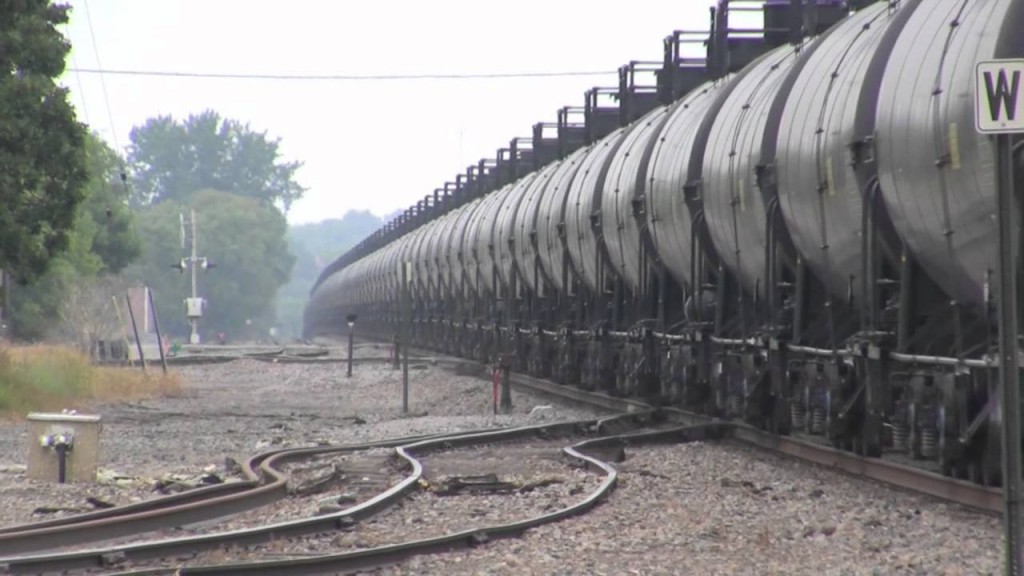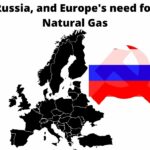It appears there’s been two oil train derailments in Montana over the last couple days. Several of the rail cars tipped over, with a few in each train leaking crude oil, but fortunately no explosions this time. Maybe it means future oil train derailments won’t cause explosions and therefore the “risk” of “dangerous” oil trains will diminish from the collective mass consciousness. If that’s what happens it would validate my post the other day – that it’s not useful to focus on the oil train explosions – because the explosions are a symptom of another problem, our continued reliance on fossil fuels and the need to stop using them.
What we need is a Gaxit (Gasoline Exit) to riff on the Grexit idea floating recently about the possibility of Greece exiting the Eurozone. Fossil fuel consumption causes a boat-load of other problems besides the occasional exploding oil train.
One of the reports below says rules which went into effect in April require processing of Bakken crude oil to remove volatile gases. The story since the Lac Megantic derailment, that destroyed that small town, has been astonishment that the Bakken crude oil is so explosive. Now with two derailments within days of each other, neither of which caused a fire, perhaps the explosion risk has been mitigated by removing these gases. It has always just been an engineering challenge to fix the root cause behind the explosions. If the railroads can fix the problem making rail cars go bang, the railroads would then be free to keep on shipping the crude oil that feeds our gasoline addiction.
Another contributing factor to the lack of explosion![]() may be that the cars involved were the newer CPC-1232 rail cars. The older DOT-111 cars are what was implicated in other explosions, and many had called for crude oil shipments in those cars to be halted. Some of the cars were jacketed, others weren’t
may be that the cars involved were the newer CPC-1232 rail cars. The older DOT-111 cars are what was implicated in other explosions, and many had called for crude oil shipments in those cars to be halted. Some of the cars were jacketed, others weren’t![]() , and the oil did conform to the North Dakota conditioning order. (that last report has lots of good information and pictures of the cleanup)
, and the oil did conform to the North Dakota conditioning order. (that last report has lots of good information and pictures of the cleanup)
If oil train derailments stop exploding, will we forget about oil shipment by rail?
On Thursday evening, July 16, 2015, a Burlington Northern Santa Fe (BNSF) oil train derailed![]() in Roosevelt County, MT, about five miles east of Culbertson MT. The derailment happened at 6:05 PM local time
in Roosevelt County, MT, about five miles east of Culbertson MT. The derailment happened at 6:05 PM local time![]() , between Culbertson and Bainville
, between Culbertson and Bainville![]() . It had 106 oil tanker cars, and 21 of the cars derailed with only two of those remaining upright. There is crude oil leaking but no fires or injuries at this time.
. It had 106 oil tanker cars, and 21 of the cars derailed with only two of those remaining upright. There is crude oil leaking but no fires or injuries at this time.
This derailment occurred only 6 hours after rail traffic had resumed moving after another derailment, on Tuesday, near Fort Kipp. Fort Kipp is a couple miles west of Culbertson.
The derailment interfered with Amtrak service![]() , and Amtrak had to shift their rail passengers to bus service to bypass the rail accident. Some of the cars in both accidents appear to have been boxcars, some empty, others carrying liquefied petroleum gas and other materials.
, and Amtrak had to shift their rail passengers to bus service to bypass the rail accident. Some of the cars in both accidents appear to have been boxcars, some empty, others carrying liquefied petroleum gas and other materials.
A local news report carried statements from some local officials![]() :
:
Roosevelt County Sheriff Jason Frederick released the following information:
There has been a train derailment approximately 6 miles east of Culbertson. The tracks are a few hundred feet south of US Hwy 2.
There are an estimated 21 cars off the track and on the ground. All were loaded with crude oil and at least 2 of the cars are leaking.
There have been no injuries associated with the derailment.
As a precaution, all people in an approximate 1 mile radius around the derailment have been evacuated. There are hazardous material teams en route to the location and emergency personnel is on scene.
Traffic on US Hwy 2 is being detoured around the derailment. Until we’re better able to determine the extent of the leak and any possible danger associated with it, we’re asking the public not to travel through this area unless it’s absolutely necessary.
Michael Cole of the Federal Railroad Administration released the following information on Friday morning:
Thursday evening a BNSF train transporting crude oil derailed near Culbertson, Montana.Local first responders are on site, and investigators from the U.S. Department of Transportation Federal Railroad Administration and Pipeline and Hazardous Materials Safety Administration are en route. While no fire is currently reported, an evacuation of nearby residents has been ordered as a precaution.
From the Montana Department of Transportation:
Several train cars have derailed causing a road closure. The closure is expected to be in place for an extended period of time. A detour using county roads has been established and will be signed. Detour speed limit will be 35 mph. Travelers should choose an alternate route.
Another local report gives lots of details. A one-half mile radius of the incident was evacuated. Since this is a rural area the houses are spread out, however an oil workers camp was evacuated. The rail line parallel’s Highway 2 (which was closed due to the accident). On the map I see at least 3 fracking sites along this section of the rail line.
No waterways were affected (the rail line crosses a couple), and the oil was contained using earthen dams. The derailment did knock over a power line. Firefighters sprayed foam to reduce the fire risk as emergency workers did their best to contain the crude oil. BNSF’s crew arrived on the scene at 3 AM Friday, more than nine hours after the derailment, and other railroad personnel arrived on Thursday evening.
The Fort Kipp derailment is described as being “20 miles away”.
The train originated in Trenton North Dakota, and was bound for Anacortes, Washington. The crude oil is owned by Statoil. This rail corridor is described as “one of the main corridors for Bakken oil shipments bound for refineries on the West Coast”. About 12 BNSF oil trains pass through Roosevelt County every week.
This article says a rule was enacted in April requiring extra processing for Bakken crude oil before shipment. The processing is to remove some volatile gases – so one can imagine this derailment is proof that it’s the volatile gases which caused the violent explosions.
Tuesday’s derailment was not precisely an oil train![]() , but one carrying a mix of cargo. The train was not carrying any hazardous materials, but had some empty tank cars with residue of ethyl alcohol and liquefied petroleum gas.
, but one carrying a mix of cargo. The train was not carrying any hazardous materials, but had some empty tank cars with residue of ethyl alcohol and liquefied petroleum gas.
Culbertson Mayor Gordon Oelkers said expressed concern about two derailments within a short distance of his town within a few days, “We’re getting 30 to 40 trains through Culbertson every day. It’s a concern for the safety of the community.”
- Is there enough Grid Capacity for Hydrogen Fuel Cell or Battery Electric cars? - April 23, 2023
- Is Tesla finagling to grab federal NEVI dollars for Supercharger network? - November 15, 2022
- Tesla announces the North American Charging Standard charging connector - November 11, 2022
- Lightning Motorcycles adopts Silicon battery, 5 minute charge time gives 135 miles range - November 9, 2022
- Tesla Autopilot under US Dept of Transportation scrutiny - June 13, 2022
- Spectacular CNG bus fire misrepresented as EV bus fire - April 21, 2022
- Moldova, Ukraine, Georgia, Russia, and the European Energy Crisis - December 21, 2021
- Li-Bridge leading the USA across lithium battery chasm - October 29, 2021
- USA increasing domestic lithium battery research and manufacturing - October 28, 2021
- Electrify America building USA/Canada-wide EV charging network - October 27, 2021






















Pingback: Is sharing oil train videos on youtube really an environmental extremism action? | The Long Tail Pipe